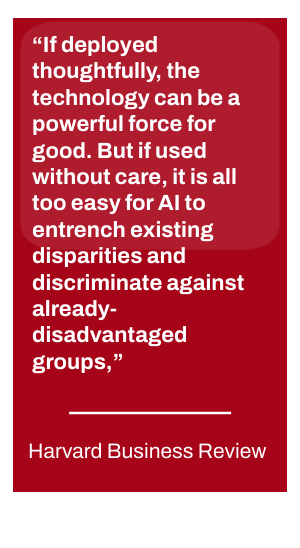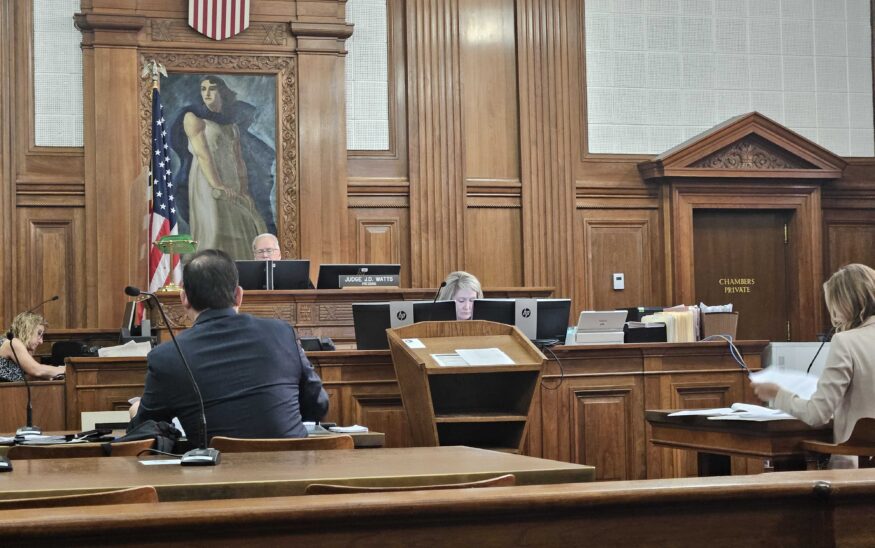Costly liability price tag for firms deploying artificial intelligence
By: Steve Schuster, [email protected]//August 21, 2023//
Costly liability price tag for firms deploying artificial intelligence
By: Steve Schuster, [email protected]//August 21, 2023//
Could artificial intelligence (AI) could steal your practice? According to legal technology experts, the answer is… maybe.
“The dangers of relying solely on generative AI include ethical dilemmas, compromised professionalism, and reputational damage,” says Tom Morgan, Director – Architect – Dynamics 365 Consultant.
In heavily regulated industries such as law, “AI poses significant risks,” says Morgan.
According to Morgan, Ethical dilemmas arise when AI-generated legal advice, contracts, or briefs contain errors or so-called ‘hallucinations’.
“The reliance on AI without proper human oversight can jeopardize the quality of legal representation and raise concerns about professional responsibility,” Morgan said.
Discrimination
On August 9, 2023, the Equal Employment Opportunity Commission (“EEOC”) announced the settlement of the agency’s first lawsuit involving the alleged discriminatory use of artificial intelligence (“AI”) in the workplace. In the lawsuit, EEOC v. iTutorGroup, Inc., the EEOC alleged that iTutorGroup’s hiring software automatically rejected older job applicants in violation of the Age Discrimination in Employment Act (“ADEA”). This settlement comes amongst the EEOC’s stated intent to enforce anti-discrimination laws in connection with the use of AI in workplace decisions, and is likely the first of many more litigations and settlements in this area, says Sullivan and Cromwell.
According to the EEOC, “While AI systems may offer new opportunities for employers, they also have the potential to discriminate.” The Federal Agency said it will examine more closely how existing and developing technologies fundamentally change the ways employment decisions are made.
Law Firm Reputational Damage
 In reputation-reliant industry such as the practice of law, maintaining trust and credibility is of utmost importance, Morgan noted.
In reputation-reliant industry such as the practice of law, maintaining trust and credibility is of utmost importance, Morgan noted.
“Generative AI systems, although capable of producing coherent and plausible text, lack the ethical judgment and subjective interpretation that lawyers provide. If AI-generated content is disseminated without proper scrutiny, it may lead to reputational damage, loss of client trust, and potential legal consequences for lawyers or law firms,” he added.
New York University Law School will hold a panel discussion in September addressing how “regulators have cautioned firms about the risks of AI with respect to unfair bias, transparency, accountability, third-party risk, and conflicts of interest.”
Back in 2020, Harvard Business Review noted the good and the bad of AI in Law.
“If deployed thoughtfully, the technology can be a powerful force for good. But if used without care, it is all too easy for AI to entrench existing disparities and discriminate against already-disadvantaged groups,” Harvard Business Review said.
International view
According to the century old Canadian-based Lavery law firm (#1 in Canadian Lawyer’s Top 10 Quebec Regional Law Firms), artificial intelligence and its potential impacts have been compared to those of the Industrial Revolution.
“The potential legal challenges faced by artificial intelligence applications in the health care industry will include civil and contractual liabilities,” firm officials noted.
“The fundamental nature of artificial intelligence technology is itself a challenge to contractual and extra-contractual liabilities. When a machine makes or pretends to make autonomous decisions based on the available data provided by its users and additional data autonomously acquired from its own environment and applications, its performance and the end-results could be unpredictable,” firm officials added, noting that “The issues of foreseeable damages or direct damages, depending on the liability regime, and of the ‘autonomous act of the thing’ will inescapably raise interesting debates in the context of artificial intelligence applications in the near future.”
Other Litigation
According to TechCrunch, as of January 2023, Microsoft, GitHub and OpenAI are currently being sued in a class action motion that accuses them of violating copyright law by allowing Copilot, a code-generating AI system trained on billions of lines of public code, to regurgitate licensed code snippets without providing credit. Two companies behind popular AI art tools, Midjourney and Stability AI, are involved in a legal case that alleges they infringed on the rights of millions of artists by training their tools on web-scraped images.
Legal News
- Police confirm ‘Heil Hitler’ salute during Madison pro-Palestinian protests, suspect identified
- Federal agencies failed to investigate Havana Syndrome, ignored crucial evidence and withheld information, attorney says during Congressional hearing
- As Patrick Beverley calls his actions ‘inexcusable,’ police announce they’ve opened an investigation
- Democrats spend $7 million from campaign war chest in TV ads, many directed at Milwaukee northern suburbs
- Biden lauds new Microsoft center on the same site where Trump’s Foxconn project failed
- Gov. Evers seeks applicants for Eau Claire County Circuit Court
- Trump appointed judge presiding over classified documents case cancels trial
- Applicants wanted for Jefferson County, Crawford County circuit courts
- Wisconsin wedding barns sue over state’s new liquor law requiring licensing
- Audit launched of Wisconsin’s diversity efforts
- Federal appeals court approves high-voltage power line through Mississippi River refuge
- Dane County residents encouraged to weigh how to spend federal funds
WLJ People
- Power 30 Personal Injury Attorneys – Russell Nicolet
- Power 30 Personal Injury Attorneys – Benjamin Nicolet
- Power 30 Personal Injury Attorneys – Dustin T. Woehl
- Power 30 Personal Injury Attorneys – Katherine Metzger
- Power 30 Personal Injury Attorneys – Joseph Ryan
- Power 30 Personal Injury Attorneys – James M. Ryan
- Power 30 Personal Injury Attorneys – Dana Wachs
- Power 30 Personal Injury Attorneys – Mark L. Thomsen
- Power 30 Personal Injury Attorneys – Matthew Lein
- Power 30 Personal Injury Attorneys – Jeffrey A. Pitman
- Power 30 Personal Injury Attorneys – William Pemberton
- Power 30 Personal Injury Attorneys – Howard S. Sicula












